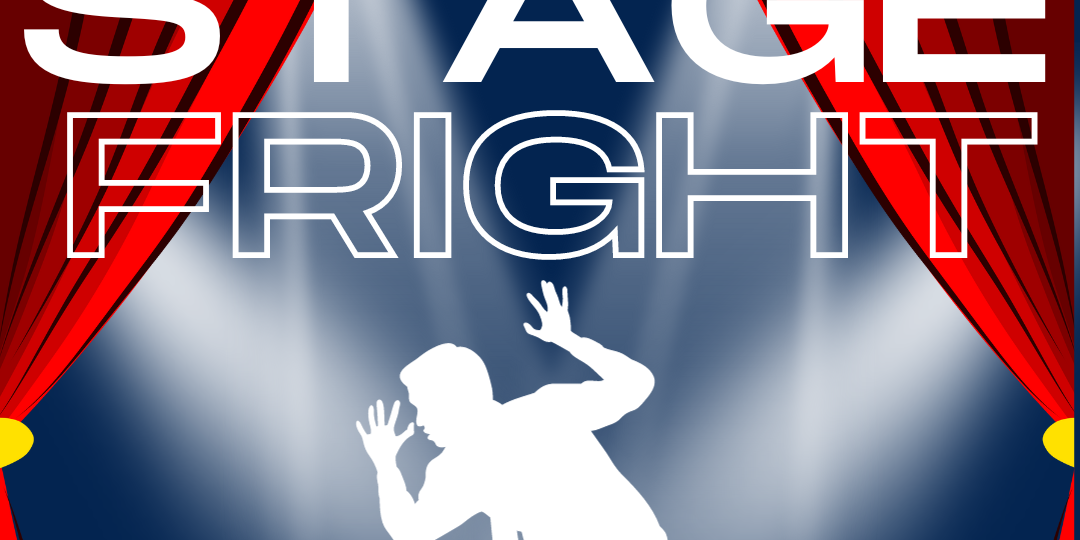
Stage fright is a phobia. It is a type of anxiety that may be aroused in an individual by the requirement
to perform in front of an audience. You have several performance levels:
Live audience familiar faces
Live audience unknown faces
In front of a camera. Stage fright does not just affect actors in the field, it’s anyone who must speak in front of an audience whether a classroom setting, business presentation, banquet or workshop presentations, job interviews, or on-line video.
Symptoms are:
Stuttering, tremor in hands or legs, facial tics, dry mouth, racing heart, sweating, lightheadedness, and nausea.
You would be surprised how many celebrities suffer from stage fright.
Adele – who has admitted she often vomits before performances.
Lady Gaga – who suffers from PTSD from a childhood trauma. Likes to keep to herself and keeps focused on her music.
Roy Orbison – Roy had poor eyesight and was very self-conscious. He preferred hiding behind his thick dark corrective glasses, jet black hair and dark clothing. He claimed he wasn’t trying to be weird, but the image gave him an air of mystery and security.
Others include Barbara Streisand, Johnny Dep, Ozzy Osbourne, Beyonce, Katy Perry Cher, Harry Styles…the list goes on and on. Lots of ways to cure:
- See a therapist – Lady Gaga discovered an underlying issue that caused her fright.
- Shift the focus away from fear to your true intention. Envision in your mind the goal whether it is asking for a raise, additional time to complete a project, etc.
- Practice. Practice in front of a trusted friend or loved one and ask for feedback.
- Give yourself positive thoughts such as “even if I’m nervous, I will come across confident, people want to hear what I have to say, or I’m going to do a great job,”.
- Visualization. Visualize yourself singing, shooting a hoop, giving the demonstration. Think about how it feels to succeed and be at ease.
- Deep breathing exercises.
- Grounding exercises. When you feel yourself getting nervous, think of your five senses. What are five things you see, four things you hear, three things you feel, two things you smell and one things you can taste. Figuring these things out shifts your attention away from your anxiety.
- Avoid Caffeine and Mood-Altering Substances!! This will worsen your nerves, not calm them. A healthy snack or meal will provide you with energy.
- For older actors, home in on your material. Face it, the audience is coming to be entertained not to see you unless you are a major celebrity (as harsh as it sounds). Younger actors – relax itis about you. Your friends and family are so proud whether you hit the high note or not. Remember the musical The Music Man; they didn’t care if their kids couldn’t play instruments, They were happy they put on a uniform and joined.
- Choose a focal point. Pick a spot to focus on to sing or speak to. In a play, focus over the audience’s head, not directly on them.
- Stick with what works. If you are not a great joke teller, don’t make wisecracks. If you normally wear flat shoes, don’t walk on stage in heels. Avoid drastic changes to who you are.
- Expose yourself to acting and or speaking situations. Parents enroll them in the theater early. It’s not about pressure, it is about learning and fun. Adults attend amateur performances, speaking engagements, motivational workshops and watch the pros in action. Learn from them, mistakes as well as greatness.
- ASSESS YOUR PERFORMANCE. Identify two to three accomplishments, no matter how small. Bottom line is we all have fears, so we can face them or flee from them. Stage fright is not uncommon and only a few have “what it takes” to get in front of people without the fear of failure or not being good enough. Yes, we are cocky, but that’s what gets us on the podium. Theater is a huge part of building confidence and self-esteem. Next blog will feature what the theater builds.

